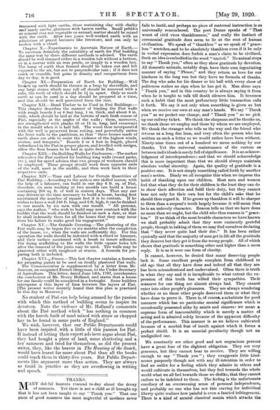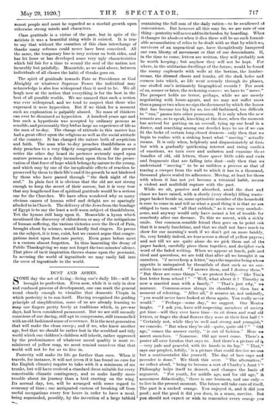THANKS.
MANY doleful laments resound to-day about the decay_ of manners. Yet there is not a child so ill brought up that it has not been taught to say " Thank you." That one piece of good manners the most neglectful of Mothers never fails to instil, and perhaps no piece of maternal instruction is ER universally remembered. The poet Donne speaks of "That worst of civil vices thanklessness," and really the instinct of ceremonial gratitude does seem to lie at the root of huinan civilization. We speak of " thankless " as we speak of " grace- less " wretches, and to be absolutely thankless even if it be only in verbal expression does forfeit a man's claim to be civilized. Such an idea is embodiedin the word "uncivil." No animal stops to say " Thank you," often as they show gratitude by devotion. All domestic animals, notably dogs, have their own ingratiating manner of saying " Please," and they return us love for our kindness in the long run but they have no formula of thanks. The dog who asks for his dinner or his ball with every show of politeness makes no sign when he has got it. Man alone says " Thank you," and in this country he is always saying it from when he is taught to talk till death silences him. It becomes such a habit that the most perfunctory little transaction calls it forth. We say it not only when something is given us but when we receive our own at any man's hands. We say " Thank you " as we pocket our change, and " Thank you " as we pick up our railway ticket. We thank the shopman and he thanks us, we thank those we employ and those by whom we are employed. We thank the stranger who tells us the way and the friend who returns us a long due loan, and very often the person who has written us such a letter as we would rather have been without. Ninety-nine times out of a hundred we mean nothing by our thanks. Yet the universal maintenance of the custom as between individuals is surely full of significance. It is an acknow- ledgment of interdependence ; and that we should acknowledge this is more important than that we should always maintain absolute verbal sincerity. Again, the quality of gratitude is a positive one. It is not simply something called forth by another man's action. Dimly we all recognize this when we impress the habit of thanking upon our children. Most men and women feel that what they do for their children is the least they can do to show their affection and fulfil their duty, but they cannot bear not only for their own but for the child's sake that he should thus regard it. If he grows up thankless it will be sharper to them than a serpent's tooth largely because it will mean that he is an unlovely character. Reason tells us that we have done no more than we ought, but the child who thus reasons is " grace- less." If we think of the most lovable characters we have known we shall probably admit that they were eminently grateful people, though in talking of them we may find ourselves declaring that " they never quite had their due." It has been rather cynically said that the majority of men get in life all the gratitude they deserve but they get it from the wrong people. All of which shows that gratitude is something other and higher than a mere reply. It is as it were one form of charity.
It cannot, however, be denied that many deserving people lack it. Some excellent people complain from childhood to old age that all they have done and indeed all that they are has been misunderstood and undervalued. Often there is truth in what they say and it is inexplicable to what extent the ex- pression of this truth has wilted their sympathies. Their manners for one thing are almost always bad. They cannot enter into other people's pleasures. They are always wondering whether or no those other people deserved them or what they have done to prove it. There is, of course, a substitute for good manners which has no particular mental significance which is occasionally possessed alike by saints and sinners: we mean a supreme form of inaccessibility which is merely a matter of acting and is admired solely because of the apparent difficulty of the performance. This manner is as we believe cultivated because of a morbid fear of insult against which it forms a perfect shield. It is an unsocial peculiarity though not an undignified one.
We constantly see other good and not ungracious persons have a great fear of the slightest obligation. They are very generous, but they cannot bear to receive. They are willing enough to say " Thank you " ; they exaggerate little kind- nesses purposely though not with any ill-intention in order to find an outlet for a feeling which they admire in others and would cultivate in themselves, but they feel towards the whole world what we all feel towards those we dislike, that they cannot endure to be indebted to them. The feeling is the unfortunate corollary of an overweening sense of personal independence, and probably no one who has not this craving for individual liberty quite realizes how painful is even a fancied infringement. There is a kind of mental claustral mania which attacks the
sanest people and must be regarded as a morbid growth upon otherwise strong minds and characters.
Class gratitude is a virtue of the past, but in spite of the satirists it was a beautiful thing while it existed. It is true to say that without the cessation of this class interchange of thanks many reforms could never have been conceived. All the same, the temporary loss is very serious on both sides, and has let loose or has developed some very ugly characteristics which bid fair for a time to wound the soul of the nation not incurably but painfully. Meanwhile, as we said above, between individuals of all classes the habit of thanks goes on.
The spirit of gratitude towards Fate or Providence or God Almighty or whatever Supreme Power the individual may acknowledge is also less widespread than it used to be. We all laugh-now at the notion that everything is for the best in the best of all possible worlds. We are amazed that such a notion was ever widespread, and we tend to suspect that those who expressed it were hypocrites. But if we think for a moment such an explanation is palpably absurd. No mass of thinkers can ever be dismissed as hypocrites. A hundred years ago and less such a hypothesis was accepted by ordinary persons as sensible, and presumably they had as large an experience of life as the men of to-day. The change of attitude in this matter has had a great effect upon the religious as well as the social attitude of the country. It has changed the nature both of scepticism and faith. The man who to-day preaches thankfulness as a duty preaches to a very fidgety congregation, and the present writer the other day heard its pretence seriously urged upon mature persons as a duty incumbent upon them for the preser- vation of that force of hope which belongs by nature to the young, and which may by one of the inexplicable effects of reaction be preserved by them to their life's end if its growth be not hindered by those who have passed through " the dark night of the soul." In plain fact it is obvious that the old are not strong enough to keep the secret of their sorrow, but it is very true that any lengthened loss of spiritual gratitude would be a serious one for the Churches. We have often wondered why so many obvious causes of human relief and delight are so sparingly alluded to in Church. The delivery of the Jews from the bondage of Egypt is to say the least a well-worn subject of thankfulness. Yet the hymns still harp upon it. Meanwhile a hymn which mentioned the discovery of chloroform or any of the mitigations of human suffering, the various victories over the Devil of Pain, brought about by science, would hardly find singers. No poems on the subject, it is true, exist, but we cannot argue that congre- gations insist upon first-rate poetry. Even grace before meat is a custom almost forgotten. In thus lamenting the decay of Public Thanksgiving we may not forget the two-minutes' silence. That piece of tacit inspiration throws shame upon the pessimist. In accusing the world of ingratitude we may easily fall into the error of ingratitude to the world.







































 Previous page
Previous page